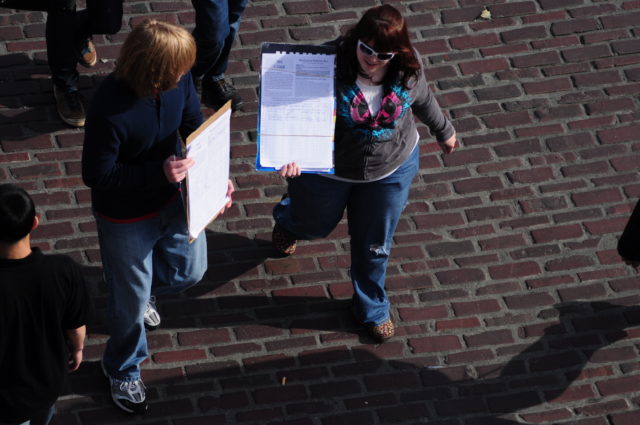
Anti-fracking activists have got their shorts in a knot because pro-fracking activists have been shadowing some of their Initiative 97 petition circulators and urging voters not to sign the petition.
Initiative 97, in case you’ve just emerged from a persistent vegetative state, is a ballot measure to gut the oil and gas industry in Colorado by requiring that new oil and gas wells be set back at least 2,500 feet from any occupied structures or “vulnerable areas” like schools, parks, reservoirs, irrigation canals, etc. According to a state analysis, the measure would ban new wells on 85 percent of non-federal land in Colorado.
Colorado Rising, the group leading the Initiative 97 petition drive, has to collect 98,492 valid signatures by Aug. 6 to get the measure on the November ballot. It will probably have to turn in 30,000 or 40,000 additional signatures to ensure it has enough valid ones.
Colorado Rising is claiming that its petition circulators are being harassed and intimidated by the pro-fracking activists.
The alleged “harassment” and “intimidation” seems to consist of two or three pro-fracking activists showing up at locations where Initiative 97 petitioners are working, unfolding signs that say things like “Don’t Sign,” “Protect Colorado Jobs,” and “Would you give this guy your information?” and urging people not to sign the petition. If the Initiative 97 petitioners move, the pro-fracking activists move with them.
It takes a lot of chutzpah for anti-fracking activists to characterize this as harassment and intimidation, or to complain about harassment and intimidation at all. Their whole movement is defined by its use of harassment and intimidation.
A couple of weeks ago anti-fracking activists broke up a meeting of the Lafayette City Council. For months, the same activists have been badgering and brow-beating the Lafayette Council and the Boulder County Commissioners for failing to ban fracking — despite the fact that both Colorado law and the Colorado Supreme Court says they can’t.
Before that, anti-fracking activists in Lafayette campaigned for months to get the city to legalize “civil disobedience” aimed at shutting down oil and gas operations within the city. Some local anti-fracking firebrands have urged vandalizing drilling rigs and physically attacking drilling crews.
That anti-frackers routinely use rudeness, shaming, bullying, harassment and intimidation is hardly surprising. The movement is the ideological descendent of Occupy Wall Street, and its playbook comes straight out of Saul Alinsky.
And now they’re whining because the oil and gas industry has started playing by their rules.
Except the industry seems to be more polite about it.
Anti-frackers charging harassment and intimidation have called the cops on several occasions.
But according to Jon Anderson, an attorney advising several groups running what he called “voter education efforts” against Initiative 97 and several other lefty ballot measures, the anti-frackers’ complaints have been dismissed “usually on the spot, but always within a couple of days.”
“This is not a close call,” Anderson told Colorado Politics (née the Colorado Statesman). “The First Amendment applies to Coloradans trying to stop bad-for-business initiatives as much as it does to out-of-state petition firms trying to kill jobs and wipe out entire industries.”
Anti-fracking activists have also charged that pro-fracking activists are being paid by the industry, which they probably are.
But it turns out that a lot of Colorado Rising’s anti-fracking activists are also hired hands. Last week it emerged that Colorado Rising had hired four separate petition-circulating companies to collect signatures for Initiative 97.
So we have paid anti-fracking activists being confronted by paid pro-fracking activists. What a country. When it comes to using paid activists, the main difference between Colorado Rising’s activists and the oil and gas industry’s activists is that the oil and gas industry knows how to meet a payroll.
A couple weeks ago Colorado Rising’s main petitioning outfit, Portland, Oregon-based Direct Action Partners, abruptly closed its field offices in Denver, Boulder, Colorado Springs and Fort Collins, and skipped town — without paying hundreds of the temporary workers it had hired as petition circulators.
The company’s president, Mike Selvaggio, even tried to take seven crates of the signed petitions — containing an estimated 15,000 to 20,000 signatures — with him. (He backed off and turned them over to Colorado Rising after it sued his sorry ass.)
Selvaggio’s public statements make him sound like some kind of a weasel, but he’s acting like a guy who stiffed his workers because he got stiffed by his client.
He may well have, too. According to a story by Associated Press writer James Anderson about the dispute, Colorado Rising leader Suzanne Spiegel said her group had agreed to pay Direct Action Partners nearly $405,000.
But according to a Colorado Politics piece published on July 25, Colorado Rising had raised only $270,000 up to that point.
Colorado Politics interviewed a couple of the erstwhile petition circulators who were left in the lurch. One poor bastard, a formerly homeless man who had been thrilled to land a job paying the princely sum of $14.50 an hour, was owed $400. He said he had to borrow money to pay his cell phone bill and only had a roof over his head because he had an understanding landlord.
Another said some of the circulators in Colorado Springs were on parole and were depending on the money.
On parole, huh? And out on the street collecting people’s names and addresses. And then getting stiffed after working their butts off for $14.50 an hour. Boy that really makes an offender want to go straight and play by the rules.
The anti-fracking crowd wants you to believe they are God’s gift to social justice. A good way to test that claim is to see if Colorado Rising pays the petition circulators who got ripped off.
This opinion column does not necessarily reflect the views of Boulder Weekly.














